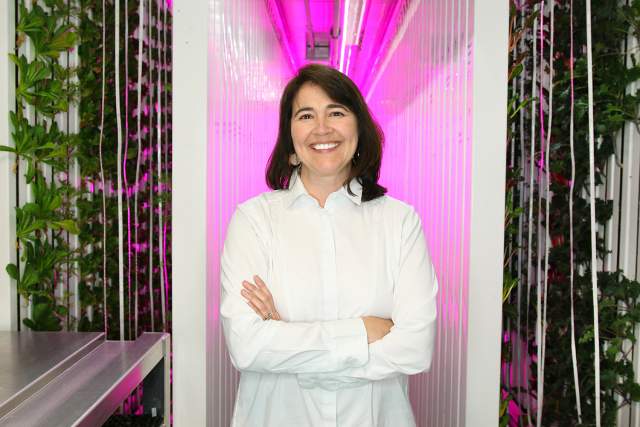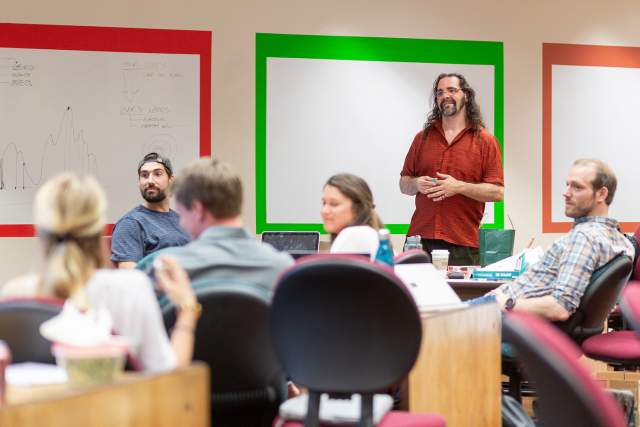Leone didn’t come to Tuck with the idea for Corleone. First, she took the elective course Entrepreneurial Thinking in her first-year winter term, which helped her understand the process behind generating and vetting startup ideas. As a former professional modern dancer, Leone knew that the dance industry is not populated with many business experts, so she figured there were plenty of unsolved problems for consumers. Her initial idea was to use 3-D-printing to make point shoes (a specific type of shoe ballerinas wear). But after conducting consumer interviews, Leone learned that a bigger problem was the market for dance apparel. The channels are either local, mom-and-pop stores with little selection, or the brands’ websites, or a non-user-friendly aggregator site that Leone describes as “worse than Amazon 1.0.” A much smaller channel is made up of former dancers who make clothing as a side-job and sell items through social media. With these sub-optimal channels, the shopping experience can be challenging for dancers, and there are very few choices for consumers focused on sustainability or ethically-produced apparel.
“Corleone will solve these problems by making the shopping process seamless,” Leone says. The company will start by manufacturing leotards—both classic and more fashionable varieties—and selling them on its website. In phase two, the company will become an online aggregator for Corleone and other dance apparel brands, with a supplier model similar to Walmart’s. “Walmart is known for working with suppliers to improve the supply chain,” Leone explains. “The equivalent for Corleone would be to identify these small businesses dancers love, and working with them on sourcing their materials efficiently and ethically.”
I want to make a company with all the characteristics Millennials have come to expect. It’s pretty intuitive: a great shopping experience, and a high-quality range of products that meet the ethical standards that people expect.
Leone is on the verge of manufacturing her first leotards under the Corleone name, and she got to this point with plenty of help from the Dartmouth community. This fall, Leone conducted an independent study with Reichstetter, and won a prize at a pitch competition organized by the Magnuson Center for Entrepreneurship at Dartmouth. And she’s been able to do extensive industry and customer research through connections in the Tuck and Dartmouth networks. “I made it known that I was looking to talk with professional dancers, and I learned that two Tuck partners are professional ballerinas,” Leone says, “and then I was connected with 25 more people to interview.” When Leone started researching the design and manufacturing process, she was connected with yet more people. “I went to an idea generation workshop for the broader Dartmouth community, and I met the head of the Thayer machine shop; he connected me with his wife, a designer with an expertise in sustainable fabrics,” she says. Even Reichstetter’s brothers, successful entrepreneurs themselves, have advised Leone on manufacturing clothing, starting a business, and using Kickstarter. “Everyone says the Tuck network will connect you to everyone you need to know, and it’s true, that happened for me,” Leone says.
Leone’s experience in the classroom has been just as crucial. Entrepreneurial Thinking is where Leone started focusing on her desire to start a business. That desire was turned into action in elective courses such as Entrepreneurship and Innovation Strategy, taught by award winning professor Ron Adner, and Multichannel Routes to Market, taught by Kusum Ailawadi, the Charles Jordan 1911 TU’12 Professor of Marketing. This winter, Leone will continue to build her business idea in the Startup Incubator, a workshop for student businesses organized by the Center for Entrepreneurship. There, Leone will team up with her husband, Garth McGee, and classmates Kevin Patrick Smith T’19 and Alison Dieringer T’19, who each bring different talents and knowledge to the Corleone business challenge.
According to Leone’s calculations, the dance apparel market in the U.S. is worth roughly $250 million. That number grows when you include the rest of the world—dancers wear similar clothing world-wide. Leone wants to serve the market with the first digital-native dance apparel company. “I want to make a company with all the characteristics Millennials have come to expect,” she says. “It’s pretty intuitive: a great shopping experience, and a high-quality range of products that meet the ethical standards that people are coming to expect.”

